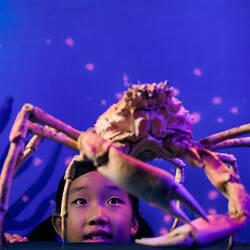Summary
While mostly white, Snowy Owls vary in the extent of black feather markings; the oldest males have the whitest feathers while young females display more dense, dark feathers. The species breeds in the Arctic tundra, with females creating a nest by scraping a shallow bowl from bare ground. Their diet consists primarily of lemmings, other voles, and mice, which they also feed to their young in the nest.
The International Union for Conservation of Nature (IUCN) considers Snowy Owls to be Vulnerable. They are also listed on Appendix II of the Convention on International Trade in Endangered Species (CITES) to prevent international trade threatening them with extinction in the wild.
Specimen Details
-
Taxon Name
-
Preferred Common name
Snowy Owl
-
Number Of Specimens
1
-
Sex
Unknown
-
Specimen Nature
Nature: Mount, Form: Dry
-
Collected By
Unknown
-
Category
-
Scientific Group
-
Discipline
-
Collecting Areas
-
Type of Item
Taxonomy
-
Kingdom
-
Phylum
-
Subphylum
-
Class
-
Order
-
Family
-
Genus
-
Species Name
scandiaca
Geospatial Information
-
Precise Location
Unknown locality
![<em>Nyctea scandiaca</em>, Snowy Owl. [B 21611]](/content/media/25/1968625-small.jpg)
![<em>Nyctea scandiaca</em>, Snowy Owl. [B 21611]](/content/media/25/1968625-thumbnail.jpg)
![<em>Nyctea scandiaca</em>, Snowy Owl. [B 21611]](/content/media/29/1968629-thumbnail.jpg)
![<em>Nyctea scandiaca</em>, Snowy Owl. [B 21611]](/content/media/37/1968637-thumbnail.jpg)
![<em>Nyctea scandiaca</em>, Snowy Owl. [B 21611]](/content/media/33/1968633-thumbnail.jpg)
![<em>Nyctea scandiaca</em>, Snowy Owl. [B 21611]](/content/media/43/1968643-thumbnail.jpg)
![<em>Nyctea scandiaca</em>, Snowy Owl. [B 21611]](/content/media/44/1968644-thumbnail.jpg)
